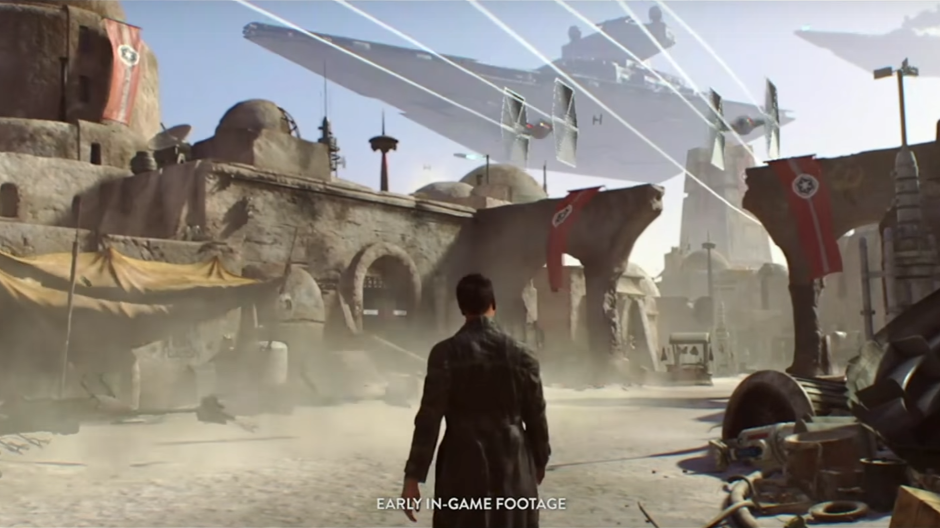The Climate of Gaming
The climate of the gaming marketplace: What EA closing Visceral studios means for games.
By Josiah Sapp
The gaming industry is still very young and has plenty of growing pains to endure. It’s already been saved once from an absolute crash back in 1983 and has seen it’s fair shares of innovative brilliance and outlandish flops. But where is the industry today? More importantly, where is it heading? In the past several years we’ve seen trends take root in the industry like the MOBA or hero shooter. We’ve also seen new tech that was supposed to “revolutionize gaming” but fell apart due to lack of imagination and support. Something that I didn’t see coming, however, is the dismantling of a founding pillar of the gaming world. The single player experience.
Some of the best and most groundbreaking video games were designed to be played by a single player. A straightforward linear progression with a beginning and end where the adventure takes place in the middle. The player takes control of the main hero or has a key role in what’s going on in the world. Legend of Zelda: Ocarina of Time has been hailed as one of the greatest games of all time and is consistently being looked to for inspiration. The way it tells a complex story with deeply engaging characters, hadn’t really been done before. The single player experience was the backbone of the game industry and where creativity thrived for developers. Resident Evil, Halo, Uncharted, and The Elder Scrolls are all gaming franchises with massive fanbases that started out with and still have amazing single player modes. However, there’s a shift in the market and Electronic Arts is making the first move.
 On October 17th 2017, EA announced that they are shutting down Visceral Studios, a branch of EA that is most known for their single player game franchise Dead Space and their work for movie titles like Lord of the Rings and James Bond. EA has the rights to existing Star Wars games and Visceral was tasked in 2013 to make a linear narrative based single player game in the franchise. They hired on Amy Hennig of Uncharted fame and even released a teaser trailer in 2016 to show off their progress. In a statement released by EA after the decision, they said they are “closely tracking fundamental shifts in the marketplace” and are “shifting the game to a broader experience”. Unfortunately, these trends in today’s gaming marketplace do not lend itself to any kind of narrative driven experience.
On October 17th 2017, EA announced that they are shutting down Visceral Studios, a branch of EA that is most known for their single player game franchise Dead Space and their work for movie titles like Lord of the Rings and James Bond. EA has the rights to existing Star Wars games and Visceral was tasked in 2013 to make a linear narrative based single player game in the franchise. They hired on Amy Hennig of Uncharted fame and even released a teaser trailer in 2016 to show off their progress. In a statement released by EA after the decision, they said they are “closely tracking fundamental shifts in the marketplace” and are “shifting the game to a broader experience”. Unfortunately, these trends in today’s gaming marketplace do not lend itself to any kind of narrative driven experience.  Today’s games are all about longevity of play. Designed from the ground up to make sure the player comes back each day. Games like Destiny and even EA’s Star Wars: Battlefront released in 2015 was made this way. Provide a slow release of content to make sure players have incentive to log in. With this model comes microtransactions and the expectations to spend more money as you pay. This is way more profitable for the company developing the game but the actual cost isn’t just a couple bucks here or there. It costs the game its creativity. When designing a game with these models from the start, it limits what developers can do. In game experiences are placed behind a wall and the password is your credit card number. There are people that may never get to see parts of their favorite games because they don’t feel like paying any more than they should. This is today’s market. Consumers are being nickel and dimed through every experience. This is why EA closing Visceral is so disheartening. It means less in-depth storytelling and more games that will cost the consumer the longer they play.
Today’s games are all about longevity of play. Designed from the ground up to make sure the player comes back each day. Games like Destiny and even EA’s Star Wars: Battlefront released in 2015 was made this way. Provide a slow release of content to make sure players have incentive to log in. With this model comes microtransactions and the expectations to spend more money as you pay. This is way more profitable for the company developing the game but the actual cost isn’t just a couple bucks here or there. It costs the game its creativity. When designing a game with these models from the start, it limits what developers can do. In game experiences are placed behind a wall and the password is your credit card number. There are people that may never get to see parts of their favorite games because they don’t feel like paying any more than they should. This is today’s market. Consumers are being nickel and dimed through every experience. This is why EA closing Visceral is so disheartening. It means less in-depth storytelling and more games that will cost the consumer the longer they play.



Comments
Post a Comment